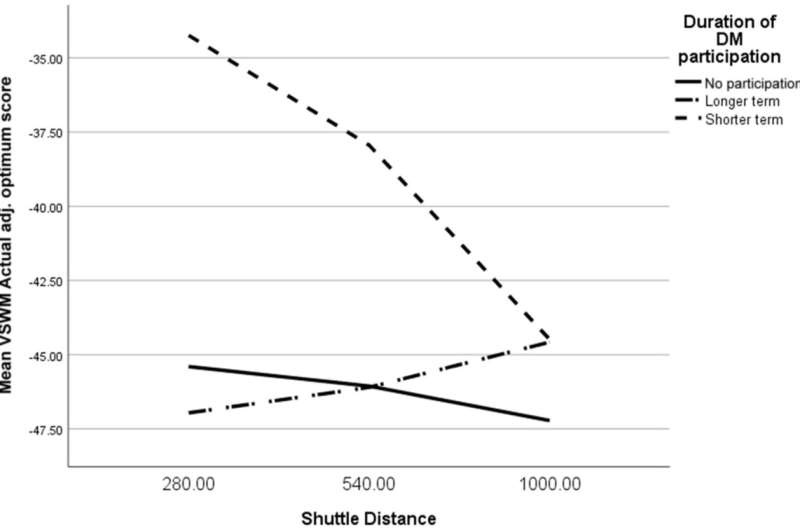Moderation of Daily Mile™ duration on relationship between shuttle distance and Visual Spatial Working Memory. Credit: Frontiers in Psychology (2022). DOI: 10.3389/fpsyg.2022.812616
Schoolchildren who run or walk for 15 minutes during the school day are mentally and physically sharper than those who do not, according to a new study involving the University of Stirling.
Primary school pupils who took part in a running program, such as the Daily Mile, for longer than three months were fitter than those who participated for a shorter time, researchers said.
Taking time out of lessons for a run or walk did not have a negative effect on pupils' thinking skills or well-being, while greater fitness was also found to be related with better memory.
The study is the first to look at the long-term effects on psychological health of school-based running programs such as the Daily Mile, which involves children taking a 15-minute break from class to do physical activity.
The Daily Mile, which was established by a headteacher in Stirling, celebrates its 10th birthday today (Thursday, 28 April), with more than three million children now participating in the program worldwide.
Dr. Colin Moran, of the University of Stirling's Faculty of Health Sciences and Sport, has led a number of studies on the Daily Mile and is involved in the new research.
He said: "It's great to see the longer term benefits of the Daily Mile for kids' health coming through in our work."
For this latest study, researchers at the Universities of Stirling, Edinburgh and Highlands and Islands observed 6,000 pupils aged nine to 11 who undertook a series of cognitive function tests. The team worked with schools and the BBC's Terrific Scientific educational initiative to collect the data for the largest ever study into the benefits of the Daily Mile.
Teachers guided pupils through a bleep test to measure fitness and then pupils completed bespoke computer-based tasks to measure attention and memory and reported their own well-being.
The team used statistical models to analyze the impact of a long-term running program on a pupil's cognition, well-being and fitness. They also considered other factors, such as age, sex and socio-economic status.
Findings showed fitness had a small but detectable association with better memory and thinking skills in pupils who had taken part for less than two months. While participating for longer three months had a significant association with higher fitness levels, no benefits for cognition and well-being were found.
This study shows the positive effects of school based running programs on fitness and mental abilities, researchers say.
Dr. Josie Booth, of the University of Edinburgh's Moray House School of Education and Sport, said: "Taking part in the Daily Mile each day can improve pupil fitness and while we did not find longer term benefits for cognition and well-being, there was no substantial negative impact either. The health benefits of physical activity coupled with the immediate benefit, which supports learning, makes such physical activity breaks worthwhile and should be considered by class teachers and school management, as well as education policy makers."
The latest study is published in Frontiers in Psychology.
More information: Josephine N. Booth et al, The Impact of the Daily Mile on School Pupils' Fitness, Cognition, and Wellbeing: Findings From Longer Term Participation, Frontiers in Psychology (2022). DOI: 10.3389/fpsyg.2022.812616
Journal information: Frontiers in Psychology
Provided by University of Stirling























